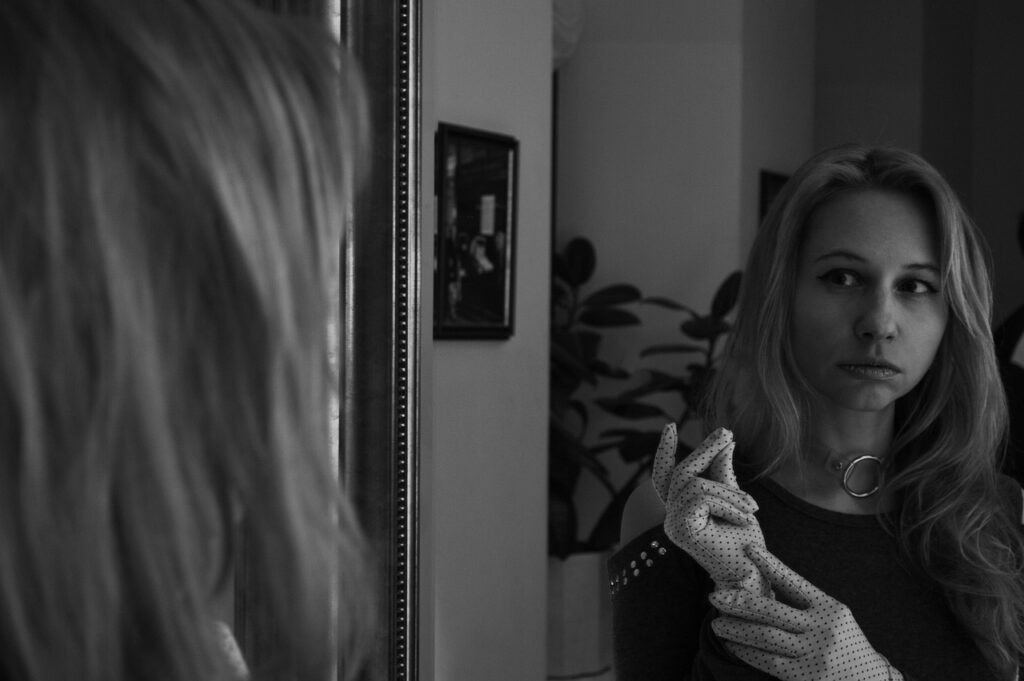Are you stuck in a never-ending cycle of negative thoughts? When you’re struggling with low self-esteem, low mood, anxiety, or depression, this type of thinking can become a vicious cycle, often without us even realising it’s happening.
The inner voice is a sly one, spinning unhelpful thoughts from deep-rooted beliefs and cementing them even further. A cycle of negative thoughts can infect your everyday life, and your perception of your whole self can become warped in pessimism.
“You’ll never measure up,” her inner voice whispered, as she scrutinised her reflection in the mirror.

Ever find yourself hearing things like this when you catch your reflection? Or feel like your partner doesn’t find you attractive anymore? Think that your friends secretly don’t like you? Wonder if you’ll ever regain the confidence you had before parenthood? Feel like you’ll just never be good enough?
Negative thoughts can spiral out of control, potentially keeping you stuck in a state of anxiety or depression. But why do we fall into negative thinking habits, and is it actually possible to overcome them?
First off, it can be really helpful to know the different types of thought patterns, so that you can learn to identify them. In this post, we’re going to look at the 10 most common unhelpful thinking habits. Then, we’ll provide you with some questions to help you identify which ones you tend to fall into, so that you can learn to challenge them.
The link between low self-esteem, negative thoughts, and depression
So, what causes unhelpful thinking habits in the first place? Well, there’s a common link between the level of your self-esteem and negative thoughts. Low self-esteem often originates from past experiences, societal pressures, and constant comparisons, and the lower your self-esteem, the more inclined you are to view yourself in a negative light.
As explained on the NHS website, living with long-term low self-esteem can affect your mental health. And in her book Overcoming Low Self-Esteem, Dr Melanie Fennell discusses how a person with depression may almost always see themselves in a negative light. So you can see how negative thinking and low self-esteem can seem like a never ending cycle.
Now that we know how we can feel stuck, let’s look at the 10 most common types of these negative thought patterns. For the purpose of this post, we’ll call these ‘unhelpful thinking habits’.
The World Health Organisation reports that depression is 50% more common in women than men. Aside from the impact of hormones (menstruation, pregnancy, post-partum, perimenopause and menopause), there’s also the added pressure of the mental load, lifestyle and culture. And in a world that bombards us with constant comparisons, demands to have the ‘perfect life’ and unrealistic beauty standards, it’s no wonder many of us are feeling the pressure to ‘measure up.’
The 10 most common unhelpful thinking habits
1. Emotional Reasoning: Feeling vs. Fact
Imagine this: You finish a meal, and all of a sudden, you feel stupidly full. Only, instead of accepting that you’ve simply had enough to eat, dark thoughts flood your mind as you convince yourself you must be fat. You tell yourself you’ve eaten too much. You’re out of control. How could you let yourself do this?
This, my dear friends, is emotional reasoning at its finest. It’s when we interpret situations or ourselves based solely on our feelings, ignoring the actual evidence.
2. Mental Filter: Focusing on the Negative
Now, picture a lovely evening out with your partner. It’s the perfect atmosphere, and the food is delicious. But, urgh, your stomach feels bloated. And now, instead of basking in the joy and delight of a romantic meal and this beautiful time you have together, all you can focus on is that one thing. It consumes you, and the entire experience stops being enjoyable. Your thoughts zoom in on that one negative detail, disregarding all the other wonderful parts of the evening. This is your mental filter, well and truly in action.
3. Overgeneralising: Turning Isolated Incidents into Universal Truths
Have you ever caught yourself using words like “always,” “never,” or “everyone”? For instance, believing that everyone is happier when they’re thinner? That’s overgeneralising, where one isolated situation becomes a blueprint for all current and future scenarios.
4. All or Nothing: The Extremes of Belief
Life is rarely black and white, but sometimes our minds insist otherwise. When you’ve had a bad day and decide to throw in the towel on everything, that’s the all-or-nothing thinking in action.
5. Jumping to Conclusions: Mind Reading and Fortune Telling
In the world of unhelpful thinking habits, we have mind reading and fortune telling. Mind reading involves assuming we know what others are thinking, often about us. For instance, believing that she thinks you look fat. Fortune telling is when we predict what will happen in the future, like assuming no one will talk to you at a party.
6. Disqualifying the Positives: Minimising Your Achievements
You’ve made progress, received compliments, and achieved personal growth. But instead of celebrating these wins, you disqualify the positives, convincing yourself that they don’t really count and aren’t that ‘big a deal’.
7. Labelling: Sweeping Statements About Ourselves
Labelling is when we make sweeping statements about ourselves based on specific situations. For instance, telling yourself you’re useless because you’re finding something challenging, even though there are plenty of examples that prove otherwise. You then carry this label around your neck like a noose.
8. Catastrophising: Making Mountains Out of Molehills
Ever blow things out of proportion and exaggerate possible negative outcomes? Yep.. me too! For instance, fearing that if you gain weight, no one will ever find you attractive again? That’s catastrophising at its best.
9. Personalisation: Taking Blame for Everything
Taking responsibility is admirable, but personalisation is when we blame ourselves for everything, even when we’re only partially or not at all responsible. For example, thinking it’s all your fault your partner left you or believing that if you were more attractive, they wouldn’t have cheated on you.
10. Shoulds & Musts: Unreasonable Demands
Putting unreasonable demands on yourself by saying things like “I should” or “I must” can lead to unnecessary pressure. For example, thinking you must never be a size 14 or that you should go to the gym every day.

How can you overcome negative thoughts?
I’m sure you can identify with at least one or two of the habitual thought patterns detailed above. To make matters worse, we can become stuck in an unhelpful thinking cycle without even realising. But with practice, it is possible to catch these thoughts by paying attention to what’s going on in your mind. Awareness is key. Here are some ways to help combat them:
1. Journal it out
Journaling is one of the best ways to work out what’s going on. Because the more you write about something that’s bothering you, the easier it is to drill down to what the problem is and where it stemmed from. So to help you identify and address your own thinking habits, grab a diary, and consider the following questions: (Hint: Get your free downloadable ‘Unhelpful Thinking Habits’ PDF with question and journal prompts here)
- What was your thought?
- How were you feeling before the thought? Why were you feeling this way?
- What unhelpful thinking habit was used?
- What was the situation (people/place/object)?
- How did you feel after the thought? Why were you feeling this way?
- How did you behave after the thought? What action did you take?
- On reflection, was this helpful? If not, how could you handle it or behave differently for a better outcome?
2. Work through your emotions
It’s very easy to try to ignore that negative voice, but suppressing emotions isn’t healthy. Distracting ourselves and bottling things up may seem like a better option, but feelings always find a way out eventually. So if you need to, have a good cry, scream into a pillow, go for a walk. Make sure you acknowledge your feelings so that you can take steps to begin feeling better again.
3. Take control of your thoughts
Working through the questions above can help you identify which type of negative thinking habit you’ve fallen into, which in turn, gives you the opportunity to challenge it. One of the best ways to do this is to ask yourself, ‘is this true?’ Particularly as negative thoughts are generally based on opinions rather than facts. For example, when it’s raining, is it really a miserable day? Or is that just your perception? In reality, it’s a wet day. Challenging small thoughts such as this can help you to challenge the bigger ones that affect your day-to-day life.
4. Practice gratitude
Practising gratitude has an incredibly positive effect on mental health, because it trains your brain to look for the positive in every situation. So try writing at least 3-5 things you are grateful for each day and see how it changes your perspective.
5. Boost your self-esteem by taking action
As we touched on above, low self-esteem can fuel those unhelpful thinking habits, and as Eleanor Roosevelt said; ‘do something every day that scares you.’ Taking action shows your brain that you CAN do it, and in turn, builds confidence. Talking to people you feel safe with, who are going through the same things as you, can also make a huge difference.
You can start taking action for yourself in the free, private Facebook community, a safe, nurturing space to work on your self-confidence and limiting beliefs.
6. Talk to a trusted professional
It can be a confusing place when you’re stuck in your own head. Like journaling, talking things through with someone can help you pinpoint exactly what the problem is. The more you talk about something, the easier it will be to identify the negative thought patterns you’re stuck in.
7. Self-help with my support (for free)
If you want to try and work through your unhelpful thinking patterns yourself, with a bit of free support, I’ve got you covered.
Download your copy of my free resource, which details these Unhelpful Thinking Habits, includes the questions to get you started, and a diary/journal to help build your own self-awareness and start challenging those limiting beliefs. You can grab it here.
https://www.natalietrusdale.co.uk/unhelpfulthinkinghabits
Embrace Positive Change
Becoming aware of these unhelpful thinking habits is the first step toward transforming your self-talk and your life. It takes time and practice, so be patient with yourself. None of us are able to banish all negative thoughts, but we can learn to think more positively and develop the skills to recognise and challenge these unhelpful thinking patterns.
Along the way, remember that you’re not alone. We’re here to support one another, and together, we can break free from the shackles of low self-esteem and negative body image. You are strong, beautiful, worthy of self-love and capable of rewriting your story at any time.

Hey I’m Natalie, Supporting women like you on their road to self-acceptance and building a positive body image.

View comments
+ Leave a comment